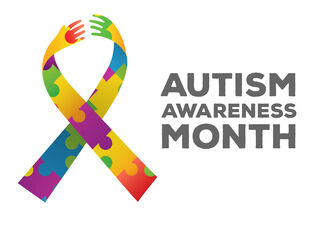Autism
Do People With Synethesia Draw Out Expression in the Autistic?
Anecdotal observations from my own dealings.
Posted April 23, 2021

Many people with autism have synesthesia while not all synesthetes experience autism.
I have noticed that people with autism open wide up to me, a polysynesthete and Highly Sensitive Person (HSP); even the nonverbal folks.
My friend's daughter with Asperger's Syndrome, often withdrawn and angry and fearful, relaxes and displays her savant-like, encyclopedic memory of film and anime when I sit with her.
A former real estate colleague's young son didn't like touch but let me carry him around on my hip, inspiring my former boss to say, "He'd be better off with YOU."
A couple of weeks ago, a 12-ish autistic boy parked near me while his father went into the store became extremely animated when we caught each others' eyes, pointed to the sunglasses on my head and with hand gestures took his own sunglasses off his head and placed them over his eyes, yelling "TeTe" at me and seemingly admonishing me to cover my eyes."
It's very curious indeed to a journalist, author and trained observer like myself -- vetting sensory wisdom personally and among experiencers and inspiring academic research as I do; interfacing with many neuroscientists.
But do my personal data points and empirical observations extend to the rest of the synesthesia community?
I recently queried several Facebook communities populated by synesthetes, which I keep in touch with and share on and mine for primary, first person accounts and knowledge. It seems my brother and sister synesthetes are having similar experiences.
Synesthete Jasmin Sinha of the German Synesthesia Association had this interesting observation:
"This is a very interesting thought, Maureen. I have observed, in a much more subtle way, that, to my surprise, some of my good friends consider themselves on the autism continuum. I had no idea. I did not notice it. We just interact, relate and have a good time together.
"This had me thinking whether I am on that continuum, too, but I don't believe it applies to me. I am, however, a highly highly sensitive person. This may also be a key to your question?"
Alexandra Kirschner, a very gifted Stuttgart music teacher added: "I am on the autism spectrum. Just as Jasmin mentioned, I feel the same way when I am with highly sensitive and gifted people. I feel comfortable and understood. Autistic people and gifted/highly sensitive people have a lot in common. It is as if we speak a common language."
Marguerite Gamble of the UK Synesthesia Association had this extraordinary insight: "I am the same. I recently had an extraordinarily gifted autistic woman tell me how grateful she was that I did not act surprised when she described one of her experiences. For me, there was no reason to react but apparently she "edits" herself, even to researchers, because of the reactions. This of course is extremely concerning from a research perspective because we are making subjects fit their experiences into the the paradigms of understanding of the researcher rather that the researcher learning to listen better. The outcome is skewed research and skewed interpretation."
Esther Kontarsky of Berlin called for more research:
"The reason why the post had me thinking was that we do not have autism in our family and yet there are two kids affected. But we have at least three cases of intense synaesthesia running through three generations."
In the end, it seems a matter of empathy for other people who are neurodiverse, like ourselves. Perhaps this will encourage more synesthetes to enter settings where they can be of service to people on the autism spectrum.
As if to confirm this theory, as I was preparing this report, another young man appearing to have autism, who I first noticed about ten feet away from me and walking toward me in New York City, presented as "distant" emotionally, with a far off look in his eyes. As we came closer to one another, he brightened and gave me a cheerful hello. It made my day.
April is Autism Awareness Month, during which we celebrate this fascinating form of consciousness.




